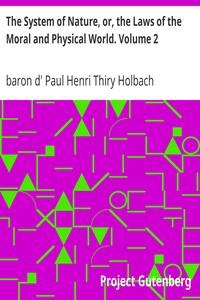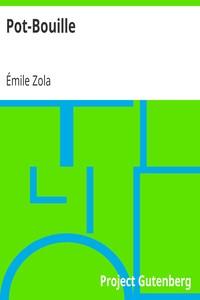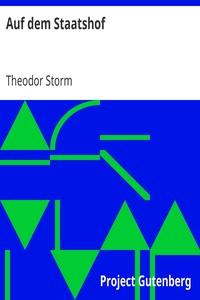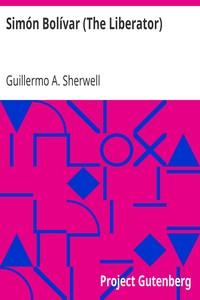Read this ebook for free! No credit card needed, absolutely nothing to pay.
Words: 139267 in 12 pages
This is an ebook sharing website. You can read the uploaded ebooks for free here. No credit cards needed, nothing to pay. If you want to own a digital copy of the ebook, or want to read offline with your favorite ebook-reader, then you can choose to buy and download the ebook.


: The System of Nature or the Laws of the Moral and Physical World. Volume 2 by Holbach Paul Henri Thiry Baron D - Philosophy and religion; Psychology; Materialism Atheism
A Brief Sketch of the Life and Writings of M. de Mirabaud
MIRABAUD'S SYSTEM OF NATURE
If man possessed the courage, if he had the requisite industry to recur to the source of those opinions which are most deeply engraven on his brain; if he rendered to himself a faithful account of the reasons which make him hold these opinions as sacred; if he coolly examined the basis of his hopes, the foundation of his fears, he would find that it very frequently happens, those objects, or those ideas which move him most powerfully, either have no real existence, or are words devoid of meaning, which terror has conjured up to explain some sudden disaster; that they are often phantoms engendered by a disordered imagination, modified by ignorance; the effect of an ardent mind distracted by contending passions, which prevent him from either reasoning justly, or consulting experience in his judgment; that this mind often labours with a precipitancy that throws his intellectual faculties into confusion; that bewilders his ideas; that consequently he gives a substance and a form to chimeras, to airy nothings, which he afterwards idolizes from sloth, reverences from prejudice.
A sensible being placed in a nature where every part is in motion, has various feelings, in consequence of either the agreeable or disagreeable effects which he is obliged to experience from this continued action and re-action; in consequence he either finds himself happy or miserable; according to the quality of the sensations excited in him, he will love or fear, seek after or fly from, the real or supposed causes of such marked effects operated on his machine. But if he is ignorant of nature, if he is destitute of experience, he will frequently deceive himself as to these causes; for want of either capability or inclination to recur back to them, he will neither have a true knowledge of their energy, nor a clear idea of their mode of acting: thus until reiterated experience shall have formed his ideas, until the mirror of truth shall have shewn him the judgment he ought to make, he will be involved in trouble, a prey to incertitude, a victim to credulity.
Man is a being who brings with him nothing into the world save an aptitude to feeling in a manner more or less lively according to his individual organization: he has no innate knowledge of any of the causes that act upon him: by degrees his faculty of feeling discovers to him their various qualities; he learns to judge of them; time familiarizes him with their properties; he attaches ideas to them, according to the manner in which they have affected him; these ideas are correct or otherwise, in a ratio to the soundness of his organic structure: his judgment is faulty or not, as these organs are either well or ill-constituted; in proportion as they are competent to afford him sure and reiterated experience.
The first moments of man are marked by his wants; that is to say, the first impulse he receives is to conserve his existence; this he would not be able to maintain without the concurrence of many analogous causes: these wants in a sensible being, manifest themselves by a general languor, a sinking, a confusion in his machine, which gives him the consciousness of a painful sensation: this derangement subsists, is even augmented, until the cause suitable to remove it re-establishes the harmony so necessary to the existence of the human frame. Want, therefore, is the first evil man experiences; nevertheless it is requisite to the maintenance of his existence. Was it not for this derangement of his body, which obliges him to furnish its remedy, he would not be warned of the necessity of preserving the existence he has received. Without wants man would be an insensible machine, similar to a vegetable; like that he would be incapable of preserving himself; he would not be competent to using the means required to conserve his being. To his wants are to be ascribed his passions; his desires; the exercise of his corporeal functions; the play of his intellectual faculties: they are his wants that oblige him to think; that determine his will, that induce him to act; it is to satisfy them or rather to put an end to the painful sensations excited by their presence, that according to his capacity, to the natural sensibility of his soul, to the energies which are peculiar to himself, he gives play to his faculties, exerts the activity of his bodily strength, or displays the extensive powers of his mind. His wants being perpetual, he is obliged to labour without relaxation, to procure objects competent to satisfy them. In a word, it is owing to his multiplied wants that man's energy is kept in a state of continual activity: as soon as he ceases to have wants, he falls into inaction--becomes listless--declines into apathy--sinks into a languor that is incommodious to his feelings or prejudicial to his existence: this lethargic state of weariness lasts until new wants, by giving him fresh activity, rouse his dormant faculties--throw off his stupor--re-animate his vigour, and destroy the sluggishness to which he had become a prey.
If no evil had existed in this world, man would never have dreamt of those numerous divinities, to whom he has rendered such various modes of worship. If nature had permitted him easily to satisfy all his regenerating wants, if she had given him none but agreeable sensations, his days would have uninterruptedly rolled on in one perpetual uniformity; he would never have discovered his own nakedness; he would never have had motives to search after the unknown causes of things--to meditate in pain. Therefore man, always contented, would only have occupied himself with satisfying his wants; with enjoying the present, with feeling the influence of objects, that would unceasingly warn him of his existence in a mode that he must necessarily approve; nothing would alarm his heart; every thing would be analogous to his existence: he would neither know fear, experience distrust, nor have inquietude for the future: these feelings can only be the consequence of some troublesome sensation, which must have anteriorly affected him, or which by disturbing the harmony of his machine, has interrupted the course of his happiness; which has shewn him he is naked.
Independent of those wants which in man renew themselves every instant; which he frequently finds it impossible to satisfy; every individual experiences a multiplicity of evils--he suffers from the inclemency of the seasons--he pines in penury--he is infected with plague--he is scourged by war--he is the victim of famine--he is afflicted with disease--he is the sport of a thousand accidents, &c. This is the reason why all men are fearful; why the whole human race are diffident. The knowledge he has of pain alarms him upon all unknown causes, that is to say, upon all those of which he has not yet experienced the effect; this experience made with precipitation, or if it be preferred, by instinct, places him on his guard against all those objects from the operation of which he is ignorant what consequences may result to himself.
His inquietude is in proportion; his fears keep pace with the extent of the disorder which these objects produce in him; they are measured by their rarity, that is to say, by the inexperience he has of them; by the natural sensibility of the soul; and by the ardour of his imagination. The wore ignorant man is, the less experience he has, the more he is susceptible of fear; solitude, the obscurity of a forest, silence, and the darkness of night, desolate ruins, the roaring of the wind, sudden, confused noises, are objects of terror to all who are unaccustomed to these things. The uninformed man is a child whom every thing astonishes; who trembles at every thing he encounters: his alarms disappear, his fears diminish, his mind becomes calm, in proportion as experience familiarizes him, more or less, with natural effects; his fears cease entirely, as soon as he understands, or believes he understands, the causes that act; or when he knows how to avoid their effects. But if he cannot penetrate the causes which disturb him, if he cannot discover the agents by whom he suffers, if he cannot find to what account to place the confusion he experiences, his inquietude augments; his fears redouble; his imagination leads him astray; it exaggerates his evil; paints in a disorderly manner these unknown objects of his terror; magnifies their powers; then making an analogy between them and those terrific objects, with whom he is already acquainted, he suggests to himself the means he usually takes to mitigate their anger; to conciliate their kindness; he employs similar measures to soften the anger, to disarm the power, to avert the effects of the concealed cause which gives birth to his inquietudes, which fills him with anxiety, which alarms his fears. It is thus his weakness, aided by ignorance, renders him superstitious.
There are very few men, even in our own day, who have sufficiently studied nature, who are fully apprised of physical causes, or with the effects they must necessarily produce. This ignorance, without doubt, was much greater in the more remote ages of the world, when the human mind, yet in its infancy, had not collected that experience, taken that expansion, made those strides towards improvement, which distinguishes the present from the past. Savages dispersed, erratic, thinly scattered up and down, knew the course of nature either very imperfectly or not at all; society alone perfects human knowledge: it requires not only multiplied but combined efforts to unravel the secrets of nature. This granted, all natural causes were mysteries to our wandering ancestors; the entire of nature was an enigma to them; all its phenomena was marvellous, every event inspired terror to beings who were destitute of experience; almost every thing, they saw must have appeared to them strange, unusual, contrary to their idea of the order of things.
Besides the ordinary phenomena to which nations were witnesses without being competent to unravel the causes, they have in times very remote from ours, experienced calamities, whether general or local, which filled them with the most cruel inquietude; which plunged them into an abyss of consternation. The traditions of all people, the annals of all nations, recal, even at this day, melancholy events, physical disasters, dreadful catastrophes, which had the effect of spreading universal terror among our forefathers, But when history should be silent on these stupendous revolutions, would not our own reflection on what passes under our eyes be sufficient to convince us, that all parts of our globe have been, and following the course of things, will necessarily be again violently agitated, overturned, changed, overflowed, in a state of conflagration? Vast continents have been inundated, seas breaking their limits have usurped the dominion of the earth; at length retiring, these waters have left striking, proofs of their presence, by the marine vestiges of shells, skeletons of sea fish, &c. which the attentive observer meets with at every step, in the bowels of those fertile countries we now inhabit--subterraneous fires have opened to themselves the most frightful volcanoes, whose craters frequently issue destruction on every side. In short, the elements unloosed, have at various times, disputed among themselves the empire of our globe; this exhibits evidence of the fact, by those vast heaps of wreck, those stupendous ruins spread over its surface. What, then, must have been the fears of mankind, who in those countries believed he beheld the entire of nature armed against his peace, menacing with destruction his very abode? What must have been the inquietude of a people taken thus unprovided, who fancied they saw nature cruelly labouring to their annihilation? Who beheld a world ready to be dashed into atoms; who witnessed the earth suddenly rent asunder; whose yawning chasm was the grave of large cities, whole provinces, entire nations? What ideas must mortals, thus overwhelmed with terror, form to themselves of the irresistible cause that could produce such extended effects? Without doubt they did not attribute these wide spreading calamities to nature; neither did they conceive they were mere physical causes; they could not suspect she was the author, the accomplice of the confusion she herself experienced; they did not see that these tremendous revolutions, these overpowering disorders, were the necessary result of her immutable laws; that they contributed to the general order by which she subsists; that, in point of fact, there was nothing more surprising in the inundation of large portions of the earth, in the swallowing up an entire nation, in a volcanic conflagration spreading destruction over whole provinces, than there is in a stone falling to the earth, or the death of a fly; that each equally has its spring in the necessity of things.
It was under these astounding circumstances, that nations, bathed in the most bitter tears, perplexed with the most frightful visions, electrified with terror, not believing there existed on this mundane ball, causes sufficiently powerful to operate the gigantic phenomena that filled their minds with dismay, carried their streaming eyes towards heaven, where their tremulous fears led them to suppose these unknown agents, whose unprovoked enmity destroyed, their earthly felicity, could alone reside.
Free books android app tbrJar TBR JAR Read Free books online gutenberg
More posts by @FreeBooks

: The Ignatian Epistles Entirely Spurious: A Reply to the Right Rev. Dr. Lightfoot by Killen W D William Dool - Ignatius Saint Bishop of Antioch -approximately 110. Correspondence. Polyglot; Ignatius Saint Bishop of Antioch -approximately 110 Authorship; Lig


: Pot-Bouille by Zola Mile - Paris (France) Fiction; France History Second Empire 1852-1870 Fiction FR Littérature






